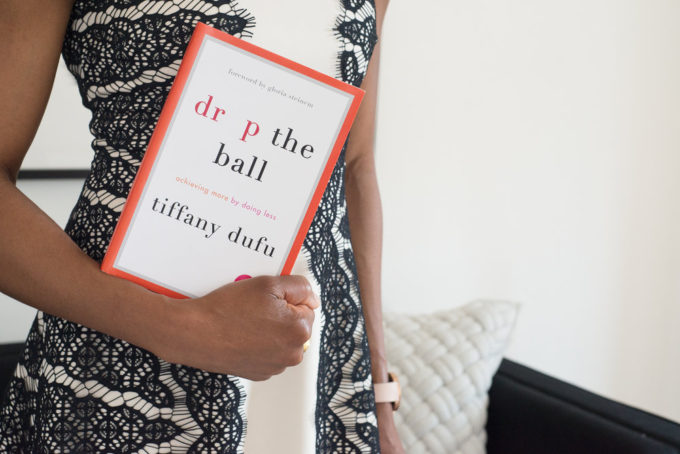
I really, really, really disliked Lean In and #GIRLBOSS.
Granted, both books were hyped up before I even picked them up. But I thought #GIRLBOSS was an ode to Sophia Amaruso’s love for herself. And while I appreciated Lean In’s thorough research, it really only applied to women in traditional office environments, with income (or income potential) to afford help at home.
I’ve been wary of ‘women & workplace’ books since. Until I read Drop The Ball.
This is the book that will actually transform your career and your home life. You just have to listen to Tiffany.
Tiffany Dufu (a fellow UW alumna, Wing woman, and New Yorker) walks the talk. She has straight up hustled at work (as a tireless advocate for women and girls) and at home (with her husband and two kids).
And not only did she cultivate satisfying home and work lives, but she shared exactly how she did it – and the challenges that came with it.
The main message of the book is to ‘drop the ball’ in the areas of your life that don’t contribute to your life’s work. Dufu does repeat her life’s work “advance women and girls” frequently throughout the book. Despite being annoyed by it in the beginning, this reaffirmation became a favorite takeaway of the book. When you are laser focused on what you want to accomplish in life, you can efficiently screen if a task or chore must be done by you, or can be done by someone else.
She also aptly discusses the ‘done is better than perfect’ adage, which is something I used to struggle with.
But what really makes Drop The Ball stand out is how skillfully Tiffany enlisted her village at various points in her life, like when her husband took a position in Dubai or when her daughter was born. Her urban family of friends, co-workers, and neighbors answered her call for help and became indispensable to her life, which she returned as she could. It’s easy to say “just hire someone” when we thinking about offloading various chores or tasks that prevent us from advancing our life’s work (or, at the very least, keeping our families alive). The reality is that most families don’t have the financial means to throw money at the problem. Tiffany lived this problem, turned it into an opportunity to thrive, and shared a step-by-step playbook on how you can do the same.
If you’re a working mother, this book is definitely for you. But I think that Drop The Ball should be mandatory reading for women about to enter or are new to the workforce. The sooner you think about the impact you want to leave in the world and the best way to do that, you immediately begin to drop the ball in the areas that don’t serve that mission. It can start with dividing chores with your roommate or prioritizing your to-do list in your job.
And it may not be fully dropping the ball at the beginning. You may be delaying the organizing of your closet, or finishing that book you keep meaning to. But if you consider your ‘life’s work’ as your first screen (which may be to ‘pay the bills’), you begin to consider what’s actually important vs. what someone else decides is important. Sometimes they’re the same, and sometimes they’re not.
My life’s work is:
- help women live their best lives, on their terms
- be present and available to my family and friends
- make my parents, husband, and son proud
- make a difference in the world (still trying to define this one more clearly)
Sometimes it’s washing a full sink of dishes while my husband gives Rho a bath. At other times, it’s pushing through a nasty case of writer’s block in order to finish a blog post.
I keep my life’s work in a Google Sheet. Underneath these screens are two columns: ‘this advances my mission’ and ‘drop this.’
I write EVERYTHING in here – from “post daily on the blog” to “do laundry” (outsource it, and spend that saved time on actual useful work).
It’s important to be mindful about the things you drop. You may hate to wash that sink full of dishes or tidy the living room, but is it important to set a positive example for your child or other folks? It’s tempting to say “I hate cleaning bathrooms, so that’s a ball I’m dropping.” Unless your time is better spent elsewhere AND someone else can pick up that ball for you, it may not be something you can actually drop.
I think this book is extraordinary, and one of the rare ones that offers real solutions that nearly anyone can implement. Even though the year is still young, I’m calling it. Drop The Ball is definitely one of my favorite books in 2017.
And maybe ever.
image via

